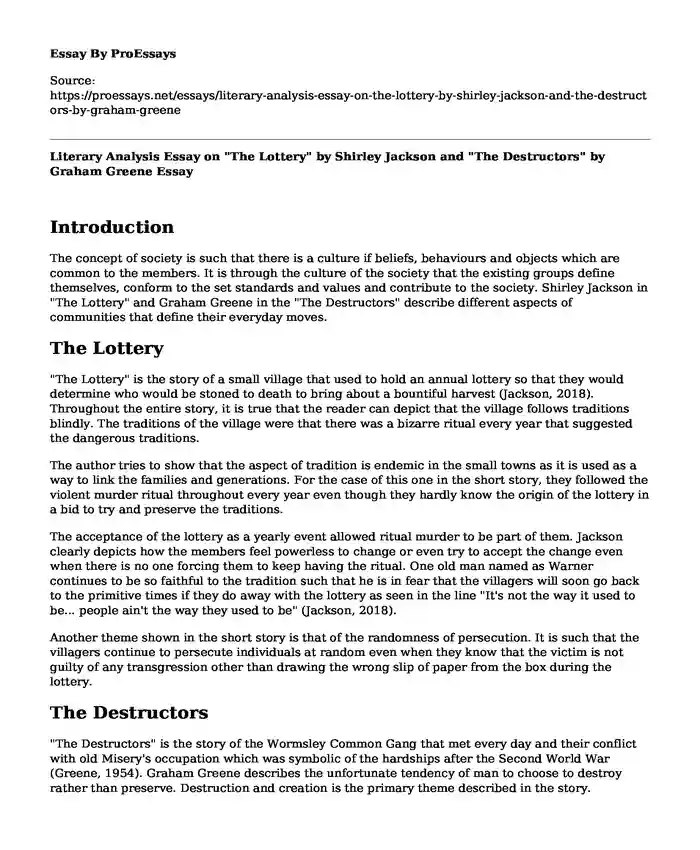Introduction
The concept of society is such that there is a culture if beliefs, behaviours and objects which are common to the members. It is through the culture of the society that the existing groups define themselves, conform to the set standards and values and contribute to the society. Shirley Jackson in "The Lottery" and Graham Greene in the "The Destructors" describe different aspects of communities that define their everyday moves.
The Lottery
"The Lottery" is the story of a small village that used to hold an annual lottery so that they would determine who would be stoned to death to bring about a bountiful harvest (Jackson, 2018). Throughout the entire story, it is true that the reader can depict that the village follows traditions blindly. The traditions of the village were that there was a bizarre ritual every year that suggested the dangerous traditions.
The author tries to show that the aspect of tradition is endemic in the small towns as it is used as a way to link the families and generations. For the case of this one in the short story, they followed the violent murder ritual throughout every year even though they hardly know the origin of the lottery in a bid to try and preserve the traditions.
The acceptance of the lottery as a yearly event allowed ritual murder to be part of them. Jackson clearly depicts how the members feel powerless to change or even try to accept the change even when there is no one forcing them to keep having the ritual. One old man named as Warner continues to be so faithful to the tradition such that he is in fear that the villagers will soon go back to the primitive times if they do away with the lottery as seen in the line "It's not the way it used to be... people ain't the way they used to be" (Jackson, 2018).
Another theme shown in the short story is that of the randomness of persecution. It is such that the villagers continue to persecute individuals at random even when they know that the victim is not guilty of any transgression other than drawing the wrong slip of paper from the box during the lottery.
The Destructors
"The Destructors" is the story of the Wormsley Common Gang that met every day and their conflict with old Misery's occupation which was symbolic of the hardships after the Second World War (Greene, 1954). Graham Greene describes the unfortunate tendency of man to choose to destroy rather than preserve. Destruction and creation is the primary theme described in the story.
One famous line state that, "Destruction, after all, is a form of creation". Graham tries to suggest the likelihood of creation in the face of destruction. The house belonging to Mr Thomas stands between structures that were destroyed as a result of air raids.
When the gang was destroying Mr Thomas' house, they tend to create for themselves new-albeit and more criminal entities that they would be acknowledged by other gangs. Similarly, in the destruction of this house, the gang creates for Mr Thomas a possibility that he may move beyond the "Old Misery" by eliminating the anchor that continues to tether him to the difficult past.
The themes of these two stories are different in that one is about how traditions shape the actions of individuals in society and the other is about conflicts in the community. In "The Destructors", the narrator uses the third person to share his thoughts of the different characters.
Through making the boys the main subject of the story and describing the actions that they are performing in the story's plot, Greene tries to reveal the absurdity of life in the clearest understanding of how life emerges from immature and fickle minds while another generation is held to its past (Greene, 1954). The aspect of suspense in the last scene where Mr Thomas is with the motorist who laughs hard, the reader is left to find out if there is another significance of the destructions.
Shirley Jackson, on the other hand, describes with cryptic symbolism the horrible story of the ceremonies with abnormal behaviours. The death of Tessie is a perfect example of how societies continue to persecute very innocent people for absurd reasons such as a community's traditions that can be done away with and would do a great deal. Tessie screams that "It isn't fair, it isn't right" but there was no one to be by her side (Jackson, 2018).
Traditions in the community that the members follow blindly are likely to lead to conflicts among them. It is important to maintain order in society and do away with unrealistic traditions. It is easy to draw the present-day parallels because prejudices that are based on religion, sex, appearance, family background happen essentially randomly. Persecution is a common phenomenon and death is so universal.
References
Greene, G. (1954). The destructors. Picture Post.
Jackson, S. (2018). The lottery. Wildside Press LLC.
Cite this page
Literary Analysis Essay on "The Lottery" by Shirley Jackson and "The Destructors" by Graham Greene. (2022, Nov 08). Retrieved from https://proessays.net/essays/literary-analysis-essay-on-the-lottery-by-shirley-jackson-and-the-destructors-by-graham-greene
If you are the original author of this essay and no longer wish to have it published on the ProEssays website, please click below to request its removal:
- Stopping by Woods on a Snowy Evening: Poem Analysis
- Analysis of Ethos, Pathos, and Logos on Three Poems and Three Short Stories
- The Yellow Paper by Gilman Charlotte - Critical Essay
- Essay Example on Kubla Khan: Poem as Social Criticism by Samuel Taylor Coleridge
- Essay Sample on Holst's Planets: A Celestial Journey of Mythology and Music
- Essay Example on Iago's Cunning Plan to Sabotage Othello and Desdemona
- Mental Book Review: "An Unquiet Mind" - Free Paper Sample







